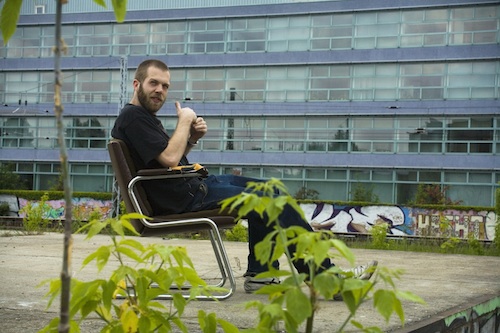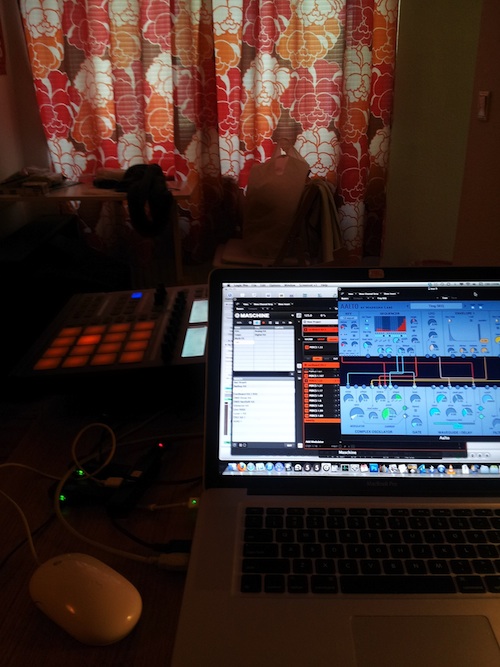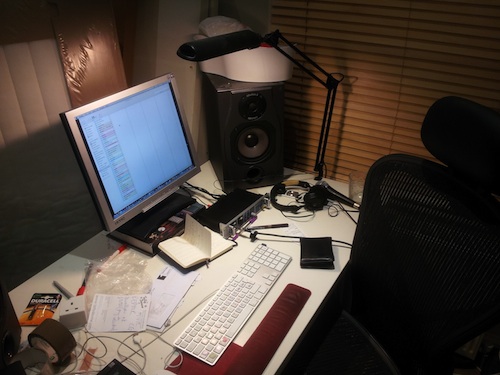
Alex Menzies is a Scottish producer and DJ. As Alex Smoke, he has carved out a unique path through the dance music world since 1994 with three albums and numerous singles that display a rare talent for combining modern compositional ideas with the demands of the dancefloor. His most recent album, the self-titled Wraetlic, marks a new project that is based more on stripped-down pop structures and expressive sound design.
Long Glasgow-based, Alex has recently moved to Berlin. By email, I asked him a little about his new music and his writing process.
I like this new music and also the name “Wraetlic” very much. It and the track titles prime me to delve into a particular kind of kind of story, but leave ample room for mystery.
Cheers! Yeah anything too explicit, and the mystery has gone……things are better left unsaid and just skirted around. Just ask David Lynch.
You are working in an territory that I think of as in between tracks and songs, from where a lot of my favorite music has come. Can you point to any influences in this area?
Yeah it's very fertile ground as far as I'm concerned, somewhere you can experiment completely but still be able to keep it comprehensible by having a vocal narrative. You can have the weirdest stuff happening in the background, but if there's a vocal, it's suddenly very accessible. People who do it well are Matthew Dear, Khonnor, How To Dress Well, Autre ne Veut, Hype Williams, to name a few. They all come from totally different angles, but the voice is like a hook for the brain to latch on to.
You said that Aalto was an inspiration on the album. Are you able to say anything about how that happens? For example, some people talk about synthesizers as tools that help you get sounds you’ve imagined in your head out into the world. Others approach them more as boxes of mystery and possibility.
Firstly, yes it is no lie that Aalto was a big part of the production of this album, and came along at the time I was just starting the project. It really inspired me. There are several things about it which immediately made it stand out and invited me to experiment, the first thing being the simplicity of the layout which just makes it so approachable, despite the fact that it is semi-modular. I know I can create interesting sounds if I have access to that routing, so it is instantly creative, and encourages experimentation. It has a purity of conception about it, if that makes sense!
I am also the kind of producer who likes to have the ability to really make the sounds in my head, and again Aalto has some very unusual features which make it possible to create timbres which I am very fond of, especially bells and clicky, unpredictable tones. The Waveguide too is a big part of the appeal for me. That sound is so much more alive than a normal oscillator, and you get the sense that you are playing with a living thing, that has to be coaxed to do what you want of it. Unlike the standard oscillator, which just blurts out its noise for you to cosh into submission with a filter.
I hear some short melodic parts that could have been done in Aalto’s sequencer. Was it useful that way?
I tend to use the sequencer as a control source for the pitch only when the sequence is either very simple or if the pitches aren't so important. For normal melodic sequences, I prefer the control of piano-roll, as it is much easier to create many pattern variations that way, and also to use that MIDI information for other parts etc. Where I do use the sequencer in particular is with the oscillator’s linear pitch input to create huge fast jumps between pitches, resulting in strange beeps and noises, especially in conjunction with the noise oscillator. Also, altering the offset of the sequencer at the same time creates some brilliantly complex tones.
What was your setup like for making this music? Do you stick to one software environment for recording? Do you do any hardware mixing or processing?
I am a simple man….I just use Logic for the sequencing aspects, although I also use Kyma as a sound design tool which is a separate environment. For me the most important thing of all is getting the ideas down fast so as not to lose any ideas, and software wins this battle hands down. I care a lot about my sound sources but again, the software is now so good that external synths are a largely unnecessary luxury for me. That's not to say I don't hanker after a Jupiter 4 or a Buchla, but they aren't strictly required, especially now that I have Aalto to fill that Buchla-shaped gap in my sound-arsenal! There is a certain amount of fetishism about hardware gear, and many people I think just have it for that added appeal. I am also less of an experimenter, in the sense that I want to write the stuff in my head, and hardware is especially suited to open experimentation where you approach with an empty idea.
Place is always important to making music, and software tools offer interesting possibilities that way. Some of this album sounds to me like it could have been made in a remote cabin or monastery. Any truth to that?
I will actually include a picture of my studio at exactly the time I was making the Wraetlic album, and you will be heavily underwhelmed……haha…… In a way you're right, in that my head is somewhere between a remote cabin and a monastery! I would still love to go on a retreat to write an album and I have always intended it, but this album was not the one. It is all down to your inner world, and that is I think the most brilliant thing of all about making music now. That you can take your inner world and express it, whilst surrounded by the most abject banality, anywhere at all. But it's that inner world that matters.
Would you like to mention any other tools (hardware, software, consumables, rituals) that are important to your process?
My working processes alternate between the shockingly simple (such as doing vocals using the MacBook's inbuilt microphone) and the heavily labour-intensive (programming Kyma), but the only common threads are a lot of tea and working late at night. I have favourite software (there's a list on my website if it's of any interest) but I find that ultimately you need very few tools, as long as they are just the right ones. I know I could have just Aalto, Absynth and Soundtoys and still make 90% of what I want to. Although I'd also miss Kyma for that last 10% of madness.
Alex Smoke presents: Wraetlic is out now on Convex Industries.


